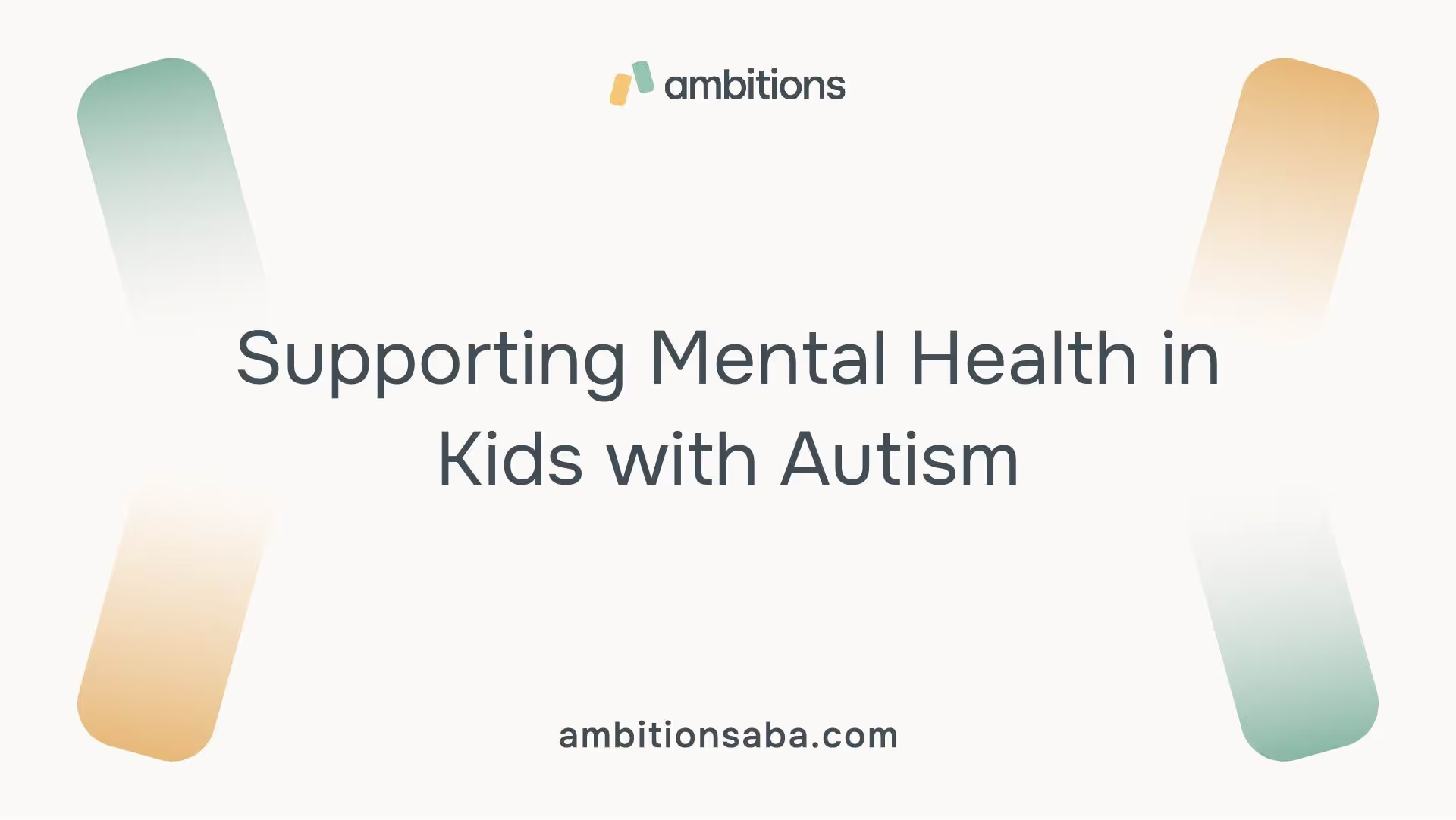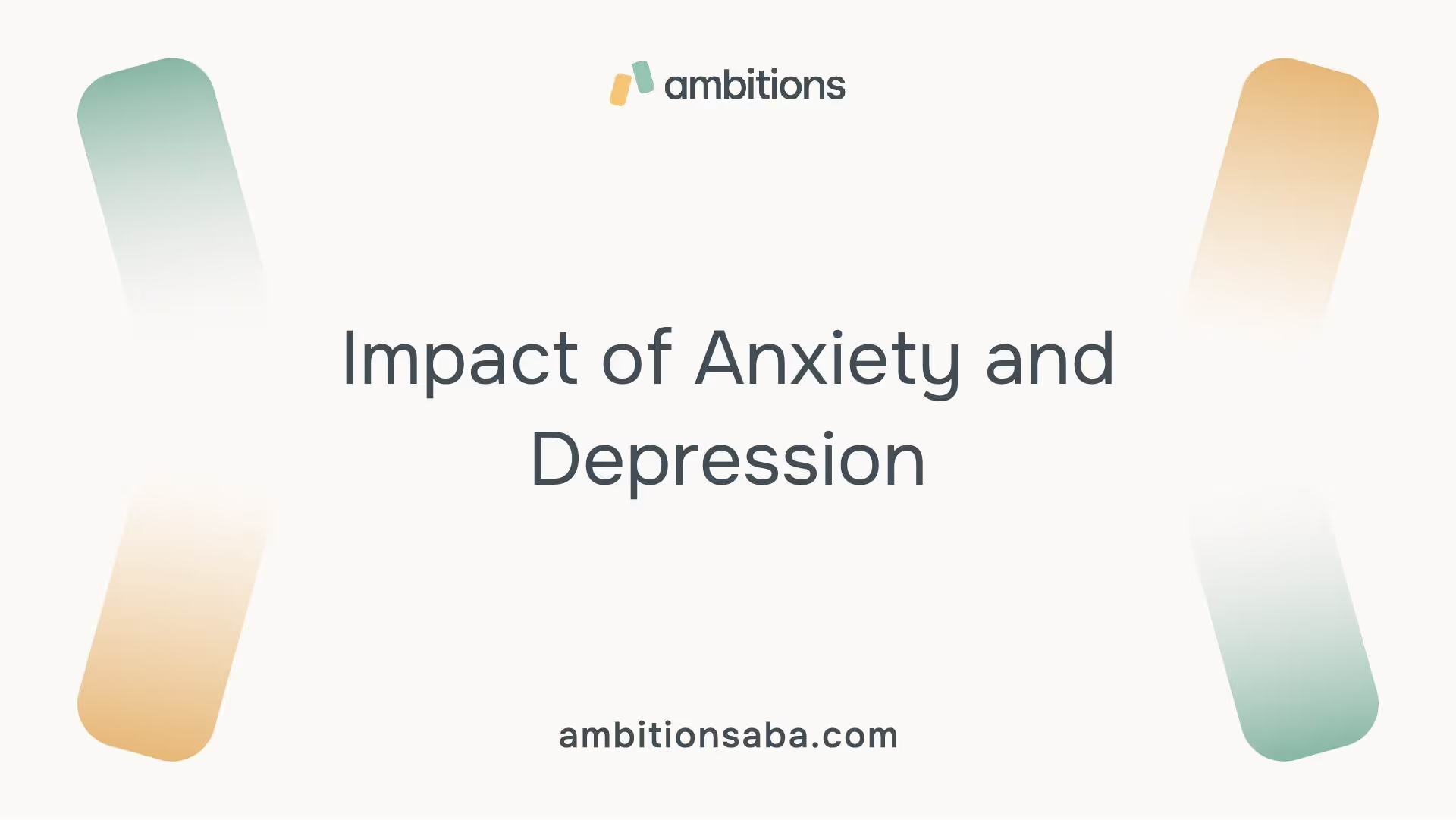Understanding Autism Mental Health

Autism often coexists with various mental health conditions, significantly impacting children's overall well-being. Research indicates that up to 84% of individuals with autism may encounter anxiety disorders, which can include generalized anxiety, separation anxiety, social anxiety, phobias, and obsessive-compulsive disorder.
Furthermore, approximately 7 out of 10 autistic individuals face mental health issues such as anxiety, depression, ADHD, or OCD [2].
- Anxiety Disorders: Up to 84%
- Depression: 26%
- ADHD: 7 out of 10
- OCD: 7 out of 10
The prevalence of these conditions underscores the necessity of supporting mental health in autism through appropriate interventions and therapeutic strategies.
Impact of Anxiety and Depression

Anxiety and depression are particularly common among children with autism. Approximately 26% of people with autism experience depression, compared to only 7% of the general population [1]. Autistic individuals may face unique challenges due to the nature of their condition, leading to heightened levels of stress and emotional distress.
Children experiencing anxiety often struggle with social interactions, leading to feelings of isolation and frustration. Similarly, depressive symptoms can affect motivation and daily functioning, resulting in decreased participation in activities they once enjoyed.
As reported by Autistica, autistic individuals are more likely to face mental health challenges throughout their lives and have a higher risk of suicide than their non-autistic peers.
To effectively address these issues, early identification and tailored interventions are crucial. Therapeutic options, such as ABA therapy for daily skills and therapeutic play for autism, can significantly contribute to improving mental well-being and enhancing the quality of life for children on the autism spectrum. By creating a supportive environment, parents can play a vital role in promoting positive mental health for their children.
Physical Health Challenges
Children diagnosed with autism often face a range of physical health challenges that can impact their overall well-being. Two significant areas of concern are gastrointestinal issues and epilepsy. Understanding these challenges can help parents better support their children’s mental health needs.
Gastrointestinal Issues
Research indicates that children with autism are up to four times more likely to experience gastrointestinal problems compared to the general population. Common gastrointestinal disturbances may include:
- Abdominal pain
- Chronic constipation
- Colitis
- Diarrhea
- Flatulence
- Gastroesophageal reflux disease (GERD)
- Irritable bowel syndrome (IBS)
These conditions can contribute to discomfort and frustration, which may exacerbate anxiety or behavioral issues. Parents should be aware of the signs and symptoms associated with these gastrointestinal problems. Regular consultation with healthcare providers can lead to effective management strategies. For more resources on autism support, visit our autism resources for new parents.
Epilepsy and Autism
Another significant health challenge for children with autism is epilepsy. Studies suggest that epilepsy can affect up to 35% of individuals with autism, compared to only 1% of the general population [1]. The presence of seizures can further complicate the mental health landscape for children on the autism spectrum.
Parents should stay alert for signs of seizures, which may include:
- Unusual behavior or movements
- Staring spells
- Loss of consciousness
- Muscle jerks
Effective communication with healthcare providers can help ensure that appropriate treatments are available. If a child experiences seizures, it is crucial to integrate these considerations into their overall care plan, including potential therapeutic options. For more on this topic, learn about the role of ABA in special education and how it can be adapted for children with additional health concerns.
By understanding these physical health challenges, parents can develop a more comprehensive support system that addresses both the mental and physical health needs of their children diagnosed with autism.
Sleep and Sensory Problems
Sleep disturbances and sensory sensitivities are two significant challenges that many children diagnosed with autism face. Understanding these issues is vital for parents seeking to provide effective support.
Sleep Disturbances
Sleep problems are common among children on the autism spectrum. Research indicates that between 50% to 80% of these children may experience one or more sleep issues, including difficulty falling asleep, night waking, waking too early, and poor sleep quality. These interruptions can have a profound impact on the child’s overall mental health, mood, and daily functioning.
- Difficulty falling asleep: 45%
- Night waking: 60%
- Waking too early: 40%
- Poor sleep quality: 70%
Parents can help by establishing a calming bedtime routine, ensuring a comfortable sleep environment, and limiting screen time before bed. Tools such as weighted blankets or white noise machines can also be beneficial for promoting better sleep. For more tips on supporting children with autism, visit our page on autism resources for new parents.
Sensory Sensitivities
Sensory sensitivities are another common challenge for children with autism. These individuals may experience heightened reactions to various sensory stimuli, including sounds, lights, textures, and smells. Environments that are not designed with neurodivergence in mind can become overwhelming for them, often leading to distress or meltdowns.
Children with sensory sensitivities may display specific responses, such as covering their ears, avoiding certain textures, or seeking out particular sensory experiences. Understanding these responses is crucial for parents.
- Sound: Fear or discomfort from loud noises, causing them to cover ears or seek quiet spaces.
- Light: Sensitivity to bright lights, leading to discomfort in brightly lit environments.
- Texture: Aversion to certain fabrics or surfaces, which can affect clothing choices.
Creating a sensory-friendly environment at home can greatly reduce anxiety. Parents might consider adjusting the lighting, using soundproofing materials, or providing sensory integration activities. For more information on sensory play, check our article on therapeutic play for autism.
By recognizing and addressing sleep disturbances and sensory sensitivities, parents can better support their child's mental health and overall well-being.
Supporting Mental Health Needs
Supporting the mental health of children with autism is crucial for their overall wellbeing. Various approaches can be utilized, including therapeutic methods and medication, to ensure they receive the necessary assistance.
Therapeutic Approaches
Therapeutic methods can significantly benefit autistic individuals. Talking therapy is one option that has shown positive results. It is important for parents to ensure that the therapists chosen have experience working with autistic individuals.
The National Autistic Society provides a helpful directory for finding qualified therapists who understand autism. Autistic individuals are encouraged to seek therapy adjustments to create a comfortable and supportive environment; these adjustments can involve modifications to the physical setting, session format, or communication style [2].
A summary of therapeutic approaches is provided in the table below:
- Talking Therapy: One-on-one sessions with a trained therapist; potential benefits include improved emotional expression and stress relief.
- Adapted Therapy: Personalized therapy that considers sensory and communication needs; potential benefits include increased comfort and engagement in sessions.
- Play Therapy: Using play to express feelings and experiences; potential benefits include enhanced understanding of emotions and social skills.
For parents looking for additional support, resources focusing on specific therapies like therapeutic play for autism may prove beneficial.
Medication and Therapy
In some cases, medication may be necessary to support the mental health needs of autistic individuals. When mental health conditions arise, it is vital for families to consult with healthcare professionals who can guide them through appropriate medications. Information on potential side effects and medication monitoring is available in guidebooks provided by the National Autistic Society.
Parents must remain informed about the various medication options and work closely with healthcare providers to find the most effective treatment plan. Additionally, many resources are available to assist families in navigating medication-related challenges, ensuring that children receive the best possible care.
A brief overview of medication considerations includes the following:
- Antidepressants: Commonly used to treat anxiety and depression; monitoring needs include regular check-ins with healthcare providers.
- Stimulants: Commonly used to manage attention issues; monitoring needs include observation of behavior changes.
- Mood Stabilizers: Commonly used to address mood swings; monitoring needs include consistent health assessments.
Overall, a combination of therapeutic approaches and the careful use of medication can play a significant role in supporting mental health in autism. Parents are encouraged to explore various options, including aba therapy for daily skills and understand the role of aba in special education as beneficial strategies.
Tailored Interventions
To effectively support mental health in autism, tailored interventions that acknowledge each child's unique needs are essential. This approach encompasses personalized care and adherence to established guidelines to ensure that the interventions are appropriate and fruitful.
Personalized Care
Personalized care is vital for children diagnosed with autism. Every child has distinct preferences, challenges, and strengths. When it comes to mental health support, it is crucial for autistic individuals to communicate their needs to feel comfortable during therapy sessions. Adjustments might include changes to the physical environment, session structure, or communication styles. This flexibility allows for a more engaging and effective therapeutic experience.
Key components of personalized care include:
- Customized therapy approaches: Choosing therapies that accommodate the child's sensory sensitivities and communication needs.
- Experienced therapists: Finding professionals who have experience working with autistic individuals ensures that they understand the unique challenges and benefits.
- Ongoing adjustments: Regularly revisiting the care plan to accommodate growth or changing needs.
NICE Guidelines for Support
The National Institute for Health and Care Excellence (NICE) provides comprehensive guidelines for supporting individuals with autism, ensuring evidence-based practices are followed. By adhering to these guidelines, families can access resourceful interventions that promote mental health.
- Assessment and Diagnosis: Regular assessments to evaluate mental health and needs.
- Therapeutic Approaches: Access to therapy tailored for autistic individuals, including talking therapies that consider sensory sensitivities.
- Medication Support: Guidance on medication options for those who may require pharmaceutical support; information on monitoring and side effects is available through resources like the National Autistic Society.
For further guidance, parents can explore resources on autism resources for new parents or consider options like therapeutic play for autism to create an engaging environment that supports their child's mental health. Special attention should be given to finding therapists competent in addressing the needs of autistic individuals, as listed in directories provided by organizations such as the National Autistic Society [2].
Opting for approaches like ABA therapy for daily skills can also enhance everyday functioning, further supporting mental health needs in a structured, yet tailored manner.
Caregiver Wellbeing
Caring for a child with autism is rewarding but can also be rife with challenges that impact the mental wellbeing of caregivers. Understanding these challenges and implementing supportive strategies is essential for both caregivers and children.
Challenges Faced by Caregivers
Caregivers of children on the autism spectrum often experience heightened stress levels, stemming from practical, psychological, and social demands. A range of factors contribute to this stress, including:
- Child-Related Factors: Managing behavioral challenges, communication difficulties, and special needs can be overwhelming.
- Family-Related Factors: Balancing caregiving with familial responsibilities can add to the pressure.
- Socio-Cultural Factors: Stigma and lack of understanding in the community can lead to isolation.
- Political Factors: Accessing necessary resources and support services can be cumbersome.
Research indicates that caregivers of children with Autism Spectrum Disorder (ASD) tend to report higher stress levels compared to those caring for children with other disabilities.
Strategies for Caregiver Support
To promote well-being among caregivers, various strategies can be employed. Here are a few effective approaches:
- Support Groups: Joining groups can provide emotional support and connection with others facing similar experiences.
- Education and Resources: Access to autism resources for new parents can help caregivers better understand autism and develop suitable strategies for their children.
- Therapeutic Interventions: Recent approaches include arts-based therapies like Dance Movement Psychotherapy (DMP), which have shown promise in enhancing caregiver well-being. DMP encourages personal growth and emotional healing [4].
By harnessing these strategies, caregivers can improve their emotional and social well-being. Engaging in community support and therapeutic methods can transform the caregiving experience, making it more manageable and fulfilling. Consider incorporating practices like therapeutic play for autism to support both the child and the caregiver throughout their journey.
References
[1]: https://autism.org/comorbidities-of-autism/
[2]: https://www.mentalhealth.org.uk/explore-mental-health/a-z-topics/autism-and-mental-health
[3]: https://www.autistica.org.uk/what-is-autism/challenges-autistic-people-face
[4]: https://www.ncbi.nlm.nih.gov/pmc/articles/PMC10403118/



